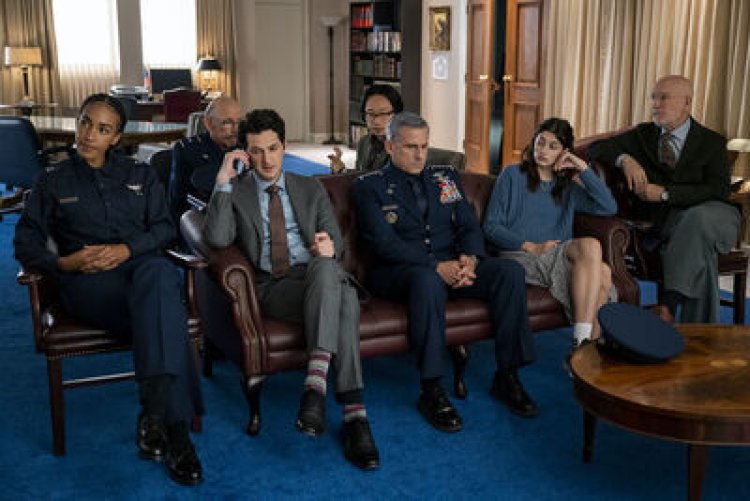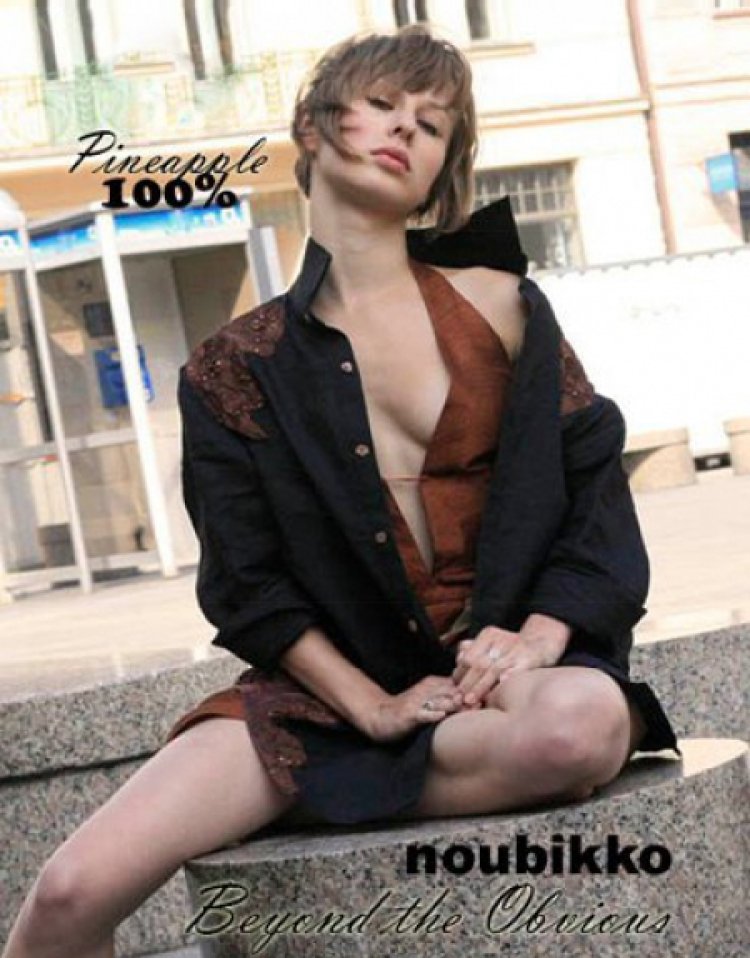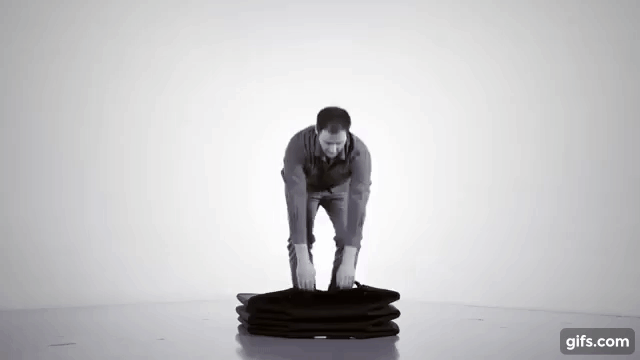Netflix's Space Force Focuses More on Great Ensemble in Season Two
When we last saw “Space Force,” things weren’t looking too great (and I say that as someone who recommended season one). In the Netflix series from creator Greg Daniels, the titular administration’s trip to the moon created a political snafu with China's own astronauts, forcing General Mark Naird (Steve Carell) to disobey orders about space combat. And in real life, the series was not the big success it had hoped to be, despite creating great chemistry between the likes of Carell, John Malkovich, Ben Schwartz, Diana Silvers, Jimmy O. Yang, Tawny Newsome, Don Lake, JayR Tinaco, and others. Hey, it happens, and it has happened to "The Office" and "Parks and Recreation," among other workplace comedies. Now, in order to keep going, both Space Force and “Space Force” have to work with budget cuts (the first season topped one million per episode). Daniels’ show leans into this and this meta joke might be the best direction for it. Carell’s General Naird begins the season just barely keeping his job, while the larger governmental forces give him four months to prove the group’s importance. That goal is not as interesting as what eventually happens, which is mostly a bunch of lighthearted, cozy nothingness. Season two brings in new co-showrunner Norm Hiscock, and works with a smaller crew and humbler plot lines that mostly only concern anyone inside the building. Aside from a few characters, it doesn’t seem like much is missing. Maybe Daniels and Carell didn’t pull off the larger scope of season one, but they did create a strong ensemble that makes for plenty of amusing scenes of unhinged banter in a boardroom, as happens many times here. You won’t miss the visual grandiosity, the constant usage of helicopters, the paintball episode from season one, or even space missions. It isn’t even that annoying when the product placement here is especially in-your-face, because that’s part of the show’s self-deprecating joke, directly referenced throughout the season. “Space Force” season two is a little too sporadic with the laugh-out-loud moments, but there was never a moment in which I cursed having to return to the series. Instead, these episodes made clear more what is special about it: the performances are so entertaining in this laidback environment that casually touts brainpower, especially when they work off each other over a silly conflict. Where else are we going to get a lovable nincompoop like Don Lake’s Brad opposite the full-bodied intense geekery of John Malkovich’s series-stealing Dr. Mallory? (Or really, anyone opposite Malkovich.) Or to see Carell in dopey austerity with Schwartz's corny Millennial promotion ideas, or Jimmy O. Yang having some kind of chaotic romantic chemistry with Newsome, newly back from the moon and not entirely right in the head? It may not be one of the funniest ensemble comedies currently, but it has the charisma of a great one. This season doesn’t hit any strides so much glide along, and sometimes surprise you with an extra goofy moment: it’s a welcome joy to suddenly needle-drop a Herb Alpert ditty, inaugurating a half of an episode dedicated to pranks. It’s in these passages that this show achieves what you more or less want from a workplace comedy, to enjoy hanging out with these people. The dramatic attachment comes secondary, but it’s not a cheap bid. Like its sense of humor, the emotional gravity wants to be only modest. “Space Force” is good, or good enough, with what matters most to it. All of season two screened for review. Season two of “Space Force” is now playing on Netflix.


When we last saw “Space Force,” things weren’t looking too great (and I say that as someone who recommended season one). In the Netflix series from creator Greg Daniels, the titular administration’s trip to the moon created a political snafu with China's own astronauts, forcing General Mark Naird (Steve Carell) to disobey orders about space combat. And in real life, the series was not the big success it had hoped to be, despite creating great chemistry between the likes of Carell, John Malkovich, Ben Schwartz, Diana Silvers, Jimmy O. Yang, Tawny Newsome, Don Lake, JayR Tinaco, and others. Hey, it happens, and it has happened to "The Office" and "Parks and Recreation," among other workplace comedies.
Now, in order to keep going, both Space Force and “Space Force” have to work with budget cuts (the first season topped one million per episode). Daniels’ show leans into this and this meta joke might be the best direction for it. Carell’s General Naird begins the season just barely keeping his job, while the larger governmental forces give him four months to prove the group’s importance. That goal is not as interesting as what eventually happens, which is mostly a bunch of lighthearted, cozy nothingness.
Season two brings in new co-showrunner Norm Hiscock, and works with a smaller crew and humbler plot lines that mostly only concern anyone inside the building. Aside from a few characters, it doesn’t seem like much is missing. Maybe Daniels and Carell didn’t pull off the larger scope of season one, but they did create a strong ensemble that makes for plenty of amusing scenes of unhinged banter in a boardroom, as happens many times here. You won’t miss the visual grandiosity, the constant usage of helicopters, the paintball episode from season one, or even space missions. It isn’t even that annoying when the product placement here is especially in-your-face, because that’s part of the show’s self-deprecating joke, directly referenced throughout the season. 
“Space Force” season two is a little too sporadic with the laugh-out-loud moments, but there was never a moment in which I cursed having to return to the series. Instead, these episodes made clear more what is special about it: the performances are so entertaining in this laidback environment that casually touts brainpower, especially when they work off each other over a silly conflict. Where else are we going to get a lovable nincompoop like Don Lake’s Brad opposite the full-bodied intense geekery of John Malkovich’s series-stealing Dr. Mallory? (Or really, anyone opposite Malkovich.) Or to see Carell in dopey austerity with Schwartz's corny Millennial promotion ideas, or Jimmy O. Yang having some kind of chaotic romantic chemistry with Newsome, newly back from the moon and not entirely right in the head? It may not be one of the funniest ensemble comedies currently, but it has the charisma of a great one.
This season doesn’t hit any strides so much glide along, and sometimes surprise you with an extra goofy moment: it’s a welcome joy to suddenly needle-drop a Herb Alpert ditty, inaugurating a half of an episode dedicated to pranks. It’s in these passages that this show achieves what you more or less want from a workplace comedy, to enjoy hanging out with these people. The dramatic attachment comes secondary, but it’s not a cheap bid. Like its sense of humor, the emotional gravity wants to be only modest. “Space Force” is good, or good enough, with what matters most to it.
All of season two screened for review. Season two of “Space Force” is now playing on Netflix.
















